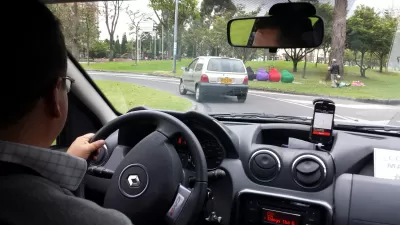Adam Greenfield looks at issue tracking systems for cities, and suggests that they can be taken a step farther by adding unique identifiers to urban infrastructure that automatically notifies city systems when problems arise.
"No issue-tracking system, even the best-designed and most cleverly devised, is going to quash the frustrations of city life completely. I believe, though, that the system I sketch out here would give cities a supple and relatively low-cost way to close the loop between Jacobian "eyes on the street," and the agencies that serve and are fully empowered to respond to them. What I've described here is, if nothing else, a way to harness the experience and rich local expertise of ordinary citizens.
But what if we took a single step further out? What if we imagined that the citizen-responsiveness system we've designed lives in a dense mesh of active, communicating public objects? Then the framework we've already deployed becomes something very different. To use another metaphor from the world of information technology, it begins to look a whole lot like an operating system for cities."
He calls this "read/write urbanism", and suggests that it could greatly enhance the way cities address urban issues.
FULL STORY: Frameworks for Citizen Responsiveness: Towards a Read/Write Urbanism

Planetizen Federal Action Tracker
A weekly monitor of how Trump’s orders and actions are impacting planners and planning in America.

Restaurant Patios Were a Pandemic Win — Why Were They so Hard to Keep?
Social distancing requirements and changes in travel patterns prompted cities to pilot new uses for street and sidewalk space. Then it got complicated.

Map: Where Senate Republicans Want to Sell Your Public Lands
For public land advocates, the Senate Republicans’ proposal to sell millions of acres of public land in the West is “the biggest fight of their careers.”

Maui's Vacation Rental Debate Turns Ugly
Verbal attacks, misinformation campaigns and fistfights plague a high-stakes debate to convert thousands of vacation rentals into long-term housing.

San Francisco Suspends Traffic Calming Amidst Record Deaths
Citing “a challenging fiscal landscape,” the city will cease the program on the heels of 42 traffic deaths, including 24 pedestrians.

California Homeless Arrests, Citations Spike After Ruling
An investigation reveals that anti-homeless actions increased up to 500% after Grants Pass v. Johnson — even in cities claiming no policy change.
Urban Design for Planners 1: Software Tools
This six-course series explores essential urban design concepts using open source software and equips planners with the tools they need to participate fully in the urban design process.
Planning for Universal Design
Learn the tools for implementing Universal Design in planning regulations.
Heyer Gruel & Associates PA
JM Goldson LLC
Custer County Colorado
City of Camden Redevelopment Agency
City of Astoria
Transportation Research & Education Center (TREC) at Portland State University
Camden Redevelopment Agency
City of Claremont
Municipality of Princeton (NJ)




























